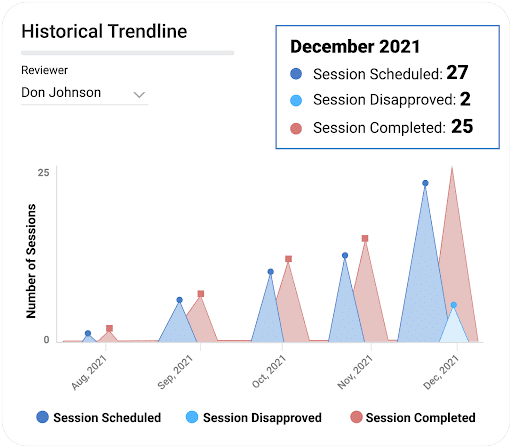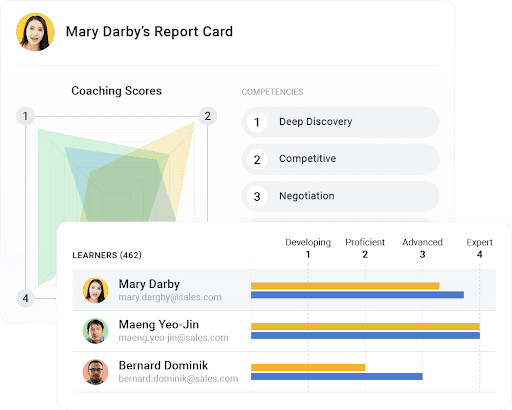Sales coaching is key for revenue organizations to continue to hit quota quarter after quarter but, unfortunately, teams continue to consistently miss their numbers. It’s true that there is no magic one-size-fits-all coaching approach that works for every team. But there are commonalities in why some sales coaching programs fail.
Learn what pitfalls to avoid when evaluating your existing sales coaching approach or when starting a more formal process for the first time.
Focusing on quantity of sales coaching sessions
Often we see statistics about the amount of time spent coaching by sales managers per month or week.
- Sales reps with 30 minutes or fewer of sales coaching per week receive win rates of 43%, and those who receive at least two hours of coaching per week have a win rate of 56%.
- 23% of sales managers spend less than 30 minutes individually coaching their direct reports each week.
- A good rule of thumb is to spend 25-40% of your time coaching your sales team.
While these metrics help set a baseline of coaching frequency for managers, they can put too much emphasis on recurring sessions and too little emphasis on what will actually be covered in the sessions to help level up your reps.
Instead, focus on the quality of your sales coaching sessions
A little prep work can go a long way, and your preparation does not have to be exhaustive. After all, as a sales manager, you’re also juggling your own quota attainment, forecasting, and the ever-looming end of quarter. Setting agendas for coaching sessions, outlining action items, and reviewing your reps’ past achievements can help keep your sessions helpful and productive.
If you start to notice that some reps are not showing progress or improvements, it may mean you need to dedicate more time to coaching these individuals.
Alternatively, sessions with your best performers may be needed less frequently. If you find your one-on-ones with these people are repetitive and it’s a struggle to find topics to cover, try reducing the number of times you meet.
Sales coaching that is only top-down
Most of us have experienced a less-than-ideal manager at some point in our careers. Sometimes in sales, the highest performing reps become managers—but that doesn’t always mean they have the formal training on how to manage and coach reps. With a large revenue organization, it can be hard to track the effectiveness of your coaches. When your sales coaching process doesn’t incorporate the feedback of reps, you could be missing the true root of performance issues.
Instead, implement a coaching feedback system
There are two key components of a coaching feedback system. The first is giving reps the ability to easily provide feedback. If you’re using a sales coaching tool, this is a critical feature that makes it easy for reps to have their voices heard. In Mindtickle sales coaching, reps can approve or disapprove coaching sessions.
In addition to providing a feedback method, make sure you are tracking this feedback. If you start to notice patterns such as negative feedback from sessions for the same manager, this manager may need more training on how to coach their team. This is a good opportunity to “coach the coach.”

Only deal coaching your reps
Deal coaching will always be a critical part of sales coaching. Reps need to know how to move forward deals that they have right in front of them. It becomes easy to focus only on these deals during coaching sessions.
Instead, spend the majority of your time on skill coaching
A proactive approach to bettering your sales team, skill coaching works to improve upon the individual skills that reps are lagging behind in. Skill coaching ensures your sessions are relevant and reinforce long-term development to improve rep performance over time. (Here’s more on deal vs. skill coaching.)
Blanket skill coaching
All of your reps possess different skill sets. They excel in different areas, have been at the company for different times, and consume training and enablement in different ways. While it saves time to focus on one skill for coaching each week or month, in the long run, this will not benefit your reps and improve their performance.
Instead, focus on the individual skills each rep needs to improve upon
Skill coaching is most effective when it is individualized. Take the time to assess the skills of your reps. View enablement and training performance, review recorded calls, and ask your reps what areas they can improve upon. A sales readiness platform can help aggregate this data and track the readiness of your reps over time.
After skill gaps are identified, work with your reps to coach them on these skills. Then, reinforce your coaching efforts with training and enablement content.

Coach your reps to success with Mindtickle
The Mindtickle Sales Readiness Platform gives you the tools and data you need to coach your reps to continued sales success. Integrating enablement and training, call recording, coaching, and content all in one platform enables revenue organizations to make data-driven decisions that win more deals. Want to learn more about how to become a sales mentor? Save your seat for our LIVE product announcement on March 22.
The post 4 Reasons Why Sales Coaching Fails (and What to Do Instead) appeared first on Mindtickle Inc..
About Mindtickle
Mindtickle is the market-leading sales readiness platform, helping revenue leaders at world-class companies like Johnson & Johnson, Splunk, and Wipro, be ready to grow revenue by increasing knowledge, understanding ideal sales behaviors, and adapting to change. Dozens of Fortune 500 and Forbes Global 2000 companies use Mindtickle to define excellence, build knowledge, align content, analyze performance, and optimize behavior throughout their sales organizations. Mindtickle is recognized as a market leader by top industry analysts and is ranked by G2 as both the #1 enterprise software product and #5 sales software product.
Website



